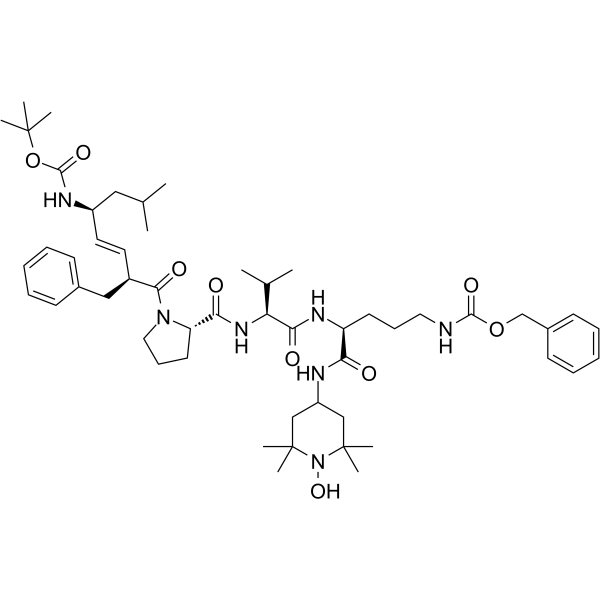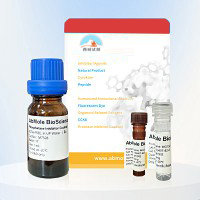| 产品介绍 |
XJB-5-131 是一种靶向线粒体的 ROS 和电子清除剂。XJB-5-131 是双功能抗氧化剂,包含自由基清除剂。XJB-5-131 是针对线粒体的合成抗氧化剂。XJB-5-131 是有效的脐带血单核细胞 (CB MNC) 电离辐射保护剂和缓和剂。
|
|---|
| 生物活性 |
XJB-5-131 is a mitochondria-targeted ROS and electron scavenger. XJB-5-131 is a bi-functional antioxidant that comprises a radical scavenger. XJB-5-131 is a synthetic antioxidant that targets mitochondria. XJB-5-131 is an effective ionizing irradiation protector and mitigator of cord blood mononuclear cells (CB MNCs).
|
|---|
| 体外研究 |
XJB-5-131 also ameliorates hemorrhagic shock (HS)-induced activation of the pro-apoptotic enzymes, caspases 3 and 7, in ileal mucosa.
XJB-5-131 reduces apoptosis and enhances cell survival in mouse embryonic cells in vitro.
XJB-5-131 is a radiation protector for colony-forming unit-granulocyte macrophage (CFU-GM). XJB-5-131 is an effective mitigator when added after irradiation.
西域 has not independently confirmed the accuracy of these methods. They are for reference only.
Cell Viability Assay
| Cell Line: |
Low density mononuclear cells (MNC) |
| Concentration: |
10 μM |
| Incubation Time: |
Added to cells one hour before irradiation or immediately after irradiation |
| Result: |
Was a protector when given before irradiation as shown by an increase in the D0 to 1.93±0.13 for CFU-GM with XJB-5-131.
|
|
|---|
体内研究
(In Vivo) |
XJB-5-131 ameliorates peroxidation of the mitochondrial phospholipid, cardiolipin, in ileal mucosal samples from rats subjected to hemorrhagic shock (HS) .
Intravenous treatment with XJB-5-131 (2 μmol/kg) significantly prolongs the survival of rats subjected to profound blood loss (33.5 mL/kg) despite administration of only a minimal volume of crystalloid solution (2.8 mL/kg) and the absence of blood transfusion.
XJB-5-131 reduces oxidative damage to mitochondrial DNA, maintains mitochondrial DNA copy number, suppresses motor decline and weight loss, enhances neuronal survival, and improves mitochondrial function. XJB-5-131 significantly suppresses the disease phenotypes and improves mitochondrial function in a mouse model of Huntington’s disease (HD) .
XJB-5-131 (1 mg/kg; intraperitoneally injected; three times a week up to 57 weeks) suppresses decline of weight loss and motor function in a mouse model of HD.
西域 has not independently confirmed the accuracy of these methods. They are for reference only.
| Animal Model: |
Male specific pathogen-free Sprague-Dawley rats, weighing 150 to 250 g |
| Dosage: |
2 μmol/kg |
| Administration: |
Administered intravenously using a syringe pump |
| Result: |
The rats treated with XJB-5-131 survived significantly longer (P < 0.01). Three of six survived for longer than 3 hours after completion of the hemorrhage protocol and one rat survived for the whole 6 hours postbleeding observation period.
|
| Animal Model: |
HD150KI mice |
| Dosage: |
1 mg/kg |
| Administration: |
Intraperitoneally injected; three times a week up to 57 weeks |
| Result: |
Chronic treatment suppressed weight loss. Increased the average body mass by 22%.
|
|
| 体内研究 |
XJB-5-131 ameliorates peroxidation of the mitochondrial phospholipid, cardiolipin, in ileal mucosal samples from rats subjected to hemorrhagic shock (HS) .
Intravenous treatment with XJB-5-131 (2 μmol/kg) significantly prolongs the survival of rats subjected to profound blood loss (33.5 mL/kg) despite administration of only a minimal volume of crystalloid solution (2.8 mL/kg) and the absence of blood transfusion.
XJB-5-131 reduces oxidative damage to mitochondrial DNA, maintains mitochondrial DNA copy number, suppresses motor decline and weight loss, enhances neuronal survival, and improves mitochondrial function. XJB-5-131 significantly suppresses the disease phenotypes and improves mitochondrial function in a mouse model of Huntington’s disease (HD) .
XJB-5-131 (1 mg/kg; intraperitoneally injected; three times a week up to 57 weeks) suppresses decline of weight loss and motor function in a mouse model of HD.
西域 has not independently confirmed the accuracy of these methods. They are for reference only.
| Animal Model: |
Male specific pathogen-free Sprague-Dawley rats, weighing 150 to 250 g |
| Dosage: |
2 μmol/kg |
| Administration: |
Administered intravenously using a syringe pump |
| Result: |
The rats treated with XJB-5-131 survived significantly longer (P < 0.01). Three of six survived for longer than 3 hours after completion of the hemorrhage protocol and one rat survived for the whole 6 hours postbleeding observation period.
|
| Animal Model: |
HD150KI mice |
| Dosage: |
1 mg/kg |
| Administration: |
Intraperitoneally injected; three times a week up to 57 weeks |
| Result: |
Chronic treatment suppressed weight loss. Increased the average body mass by 22%.
|
|
|---|
| 体内研究 |
XJB-5-131 ameliorates peroxidation of the mitochondrial phospholipid, cardiolipin, in ileal mucosal samples from rats subjected to hemorrhagic shock (HS) .
Intravenous treatment with XJB-5-131 (2 μmol/kg) significantly prolongs the survival of rats subjected to profound blood loss (33.5 mL/kg) despite administration of only a minimal volume of crystalloid solution (2.8 mL/kg) and the absence of blood transfusion.
XJB-5-131 reduces oxidative damage to mitochondrial DNA, maintains mitochondrial DNA copy number, suppresses motor decline and weight loss, enhances neuronal survival, and improves mitochondrial function. XJB-5-131 significantly suppresses the disease phenotypes and improves mitochondrial function in a mouse model of Huntington’s disease (HD) .
XJB-5-131 (1 mg/kg; intraperitoneally injected; three times a week up to 57 weeks) suppresses decline of weight loss and motor function in a mouse model of HD.
西域 has not independently confirmed the accuracy of these methods. They are for reference only.
| Animal Model: |
Male specific pathogen-free Sprague-Dawley rats, weighing 150 to 250 g |
| Dosage: |
2 μmol/kg |
| Administration: |
Administered intravenously using a syringe pump |
| Result: |
The rats treated with XJB-5-131 survived significantly longer (P < 0.01). Three of six survived for longer than 3 hours after completion of the hemorrhage protocol and one rat survived for the whole 6 hours postbleeding observation period.
|
| Animal Model: |
HD150KI mice |
| Dosage: |
1 mg/kg |
| Administration: |
Intraperitoneally injected; three times a week up to 57 weeks |
| Result: |
Chronic treatment suppressed weight loss. Increased the average body mass by 22%.
|
|
|---|
| 性状 | Solid |
|---|
| 溶解性数据 |
In Vitro:
DMSO : 125 mg/mL (130.17 mM; Need ultrasonic)
配制储备液
|
浓度
溶剂体积
质量
|
1 mg |
5 mg |
10 mg |
| 1 mM |
1.0414 mL |
5.2070 mL |
10.4140 mL |
| 5 mM |
0.2083 mL |
1.0414 mL |
2.0828 mL |
| 10 mM |
0.1041 mL |
0.5207 mL |
1.0414 mL |
*
请根据产品在不同溶剂中的溶解度选择合适的溶剂配制储备液;一旦配成溶液,请分装保存,避免反复冻融造成的产品失效。
储备液的保存方式和期限:-80°C, 6 months; -20°C, 1 month。-80°C 储存时,请在 6 个月内使用,-20°C 储存时,请在 1 个月内使用。
In Vivo:
请根据您的实验动物和给药方式选择适当的溶解方案。以下溶解方案都请先按照 In Vitro 方式配制澄清的储备液,再依次添加助溶剂:
——为保证实验结果的可靠性,澄清的储备液可以根据储存条件,适当保存;体内实验的工作液,建议您现用现配,当天使用;
以下溶剂前显示的百
分比是指该溶剂在您配制终溶液中的体积占比;如在配制过程中出现沉淀、析出现象,可以通过加热和/或超声的方式助溶
-
1.
请依序添加每种溶剂: 10% DMSO 40% PEG300 5% Tween-80 45% saline Solubility: ≥ 2.08 mg/mL (2.17 mM); Clear solution
此方案可获得 ≥ 2.08 mg/mL (2.17 mM,饱和度未知) 的澄清溶液。 以 1 mL 工作液为例,取 100 μL 20.8 mg/mL 的澄清 DMSO 储备液加到 400 μL PEG300 中,混合均匀;向上述体系中加入50 μL Tween-80,混合均匀;然后继续加入 450 μL生理盐水定容至 1 mL。
-
2.
请依序添加每种溶剂: 10% DMSO 90% corn oil Solubility: ≥ 2.08 mg/mL (2.17 mM); Clear solution
此方案可获得 ≥ 2.08 mg/mL (2.17 mM,饱和度未知) 的澄清溶液,此方案不适用于实验周期在半个月以上的实验。 以 1 mL 工作液为例,取 100 μL 20.8 mg/mL 的澄清 DMSO 储备液加到 900 μL玉米油中,混合均匀。
*以上所有助溶剂都可在 西域 网站选购。
|
|---|
| 运输条件 |
Room temperature in continental US; may vary elsewhere.
|
|---|
| 储存方式 |
| Powder |
-20°C |
3 years |
|
4°C |
2 years |
| In solvent |
-80°C |
6 months |
|
-20°C |
1 month |
|
|---|
| 参考文献 | |
|---|








 浙公网安备 33010802013016号
浙公网安备 33010802013016号